Having effective sales leaders is crucial for success. These individuals not only drive revenue and close deals, but they also inspire and motivate their teams to reach their full potential. But how can you transform your B2B salespeople into effective sales leaders?
To achieve this transformation, it’s important to grasp the distinction between a typical salesperson and a sales leader. Do both roles demand the same set of skills and qualities?
A Typical Salesperson and a Sales Leader
“A Typical Salesperson” refers to someone whose primary role is to sell products or services within a company. The core task of a typical salesperson is to engage directly with customers or clients. They present the product or service, highlight its benefits, and persuade the customer to make a purchase.
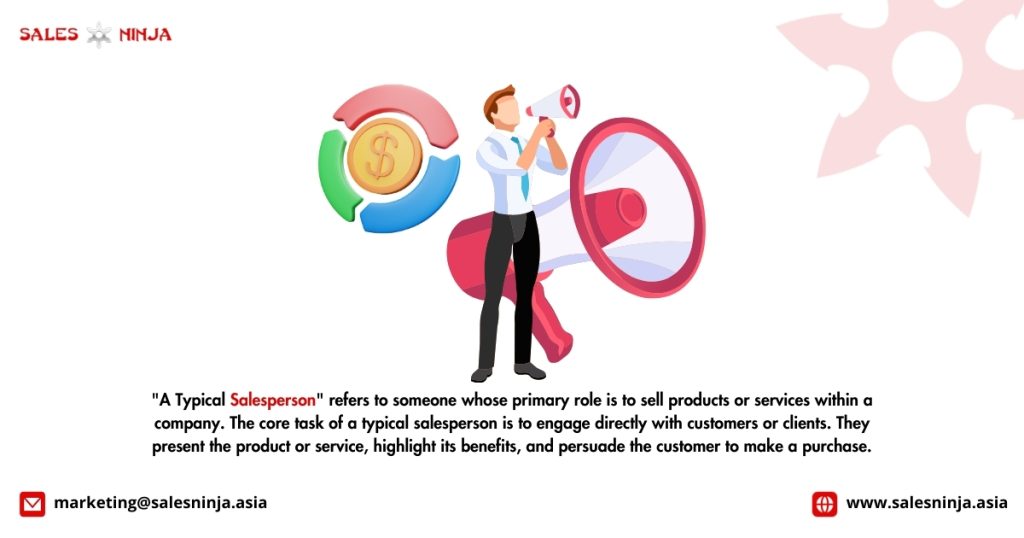
In contrast, a sales leader is a key figure in an organization who goes beyond just selling products or services and is responsible for guiding and managing a team of salespeople. He sets sales goals, provides direction, and motivates the team towards achieving these goals.
A Typical Salesperson and a Sales Leader both require some overlapping skills and qualities, but they also need distinct sets that are specific to their roles:
Overlapping Skills and Qualities:
- Communication Skills: Both roles require excellent communication abilities to clearly convey information and persuade others.
- Understanding of Products/Services: A deep knowledge of what they are selling is essential for both a salesperson and a sales leader.
- Customer Focus: Both need to understand customer needs and preferences to effectively sell or lead sales strategies.
Distinct Skills and Qualities for a Typical Salesperson:
- Direct Selling Skills: This includes the ability to engage customers, handle objections, and close sales.
- Persistence and Resilience: Salespeople often face rejection and must be able to persist and stay motivated.
- Individual Goal Orientation: They are often focused on meeting personal sales targets and quotas.
Distinct Skills and Qualities for a Sales Leader:
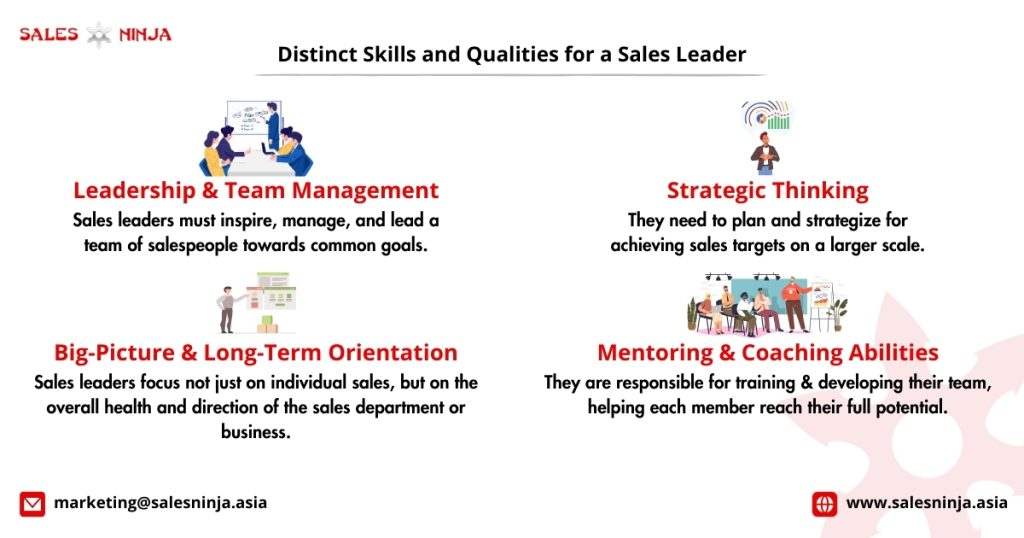
- Leadership and Team Management: Sales leaders must inspire, manage, and lead a team of salespeople towards common goals.
- Strategic Thinking: They need to plan and strategize for achieving sales targets on a larger scale.
- Big-Picture and Long-Term Orientation: Sales leaders focus not just on individual sales, but on the overall health and direction of the sales department or business.
- Mentoring and Coaching Abilities: They are responsible for training and developing their team, helping each member reach their full potential.
While both roles require strong communication and product knowledge, a typical salesperson focuses more on individual selling skills and meeting personal targets. In contrast, a sales leader needs additional skills in leadership, strategy, and team development, with a focus on broader organizational goals.
Sales Person to Sales Leader
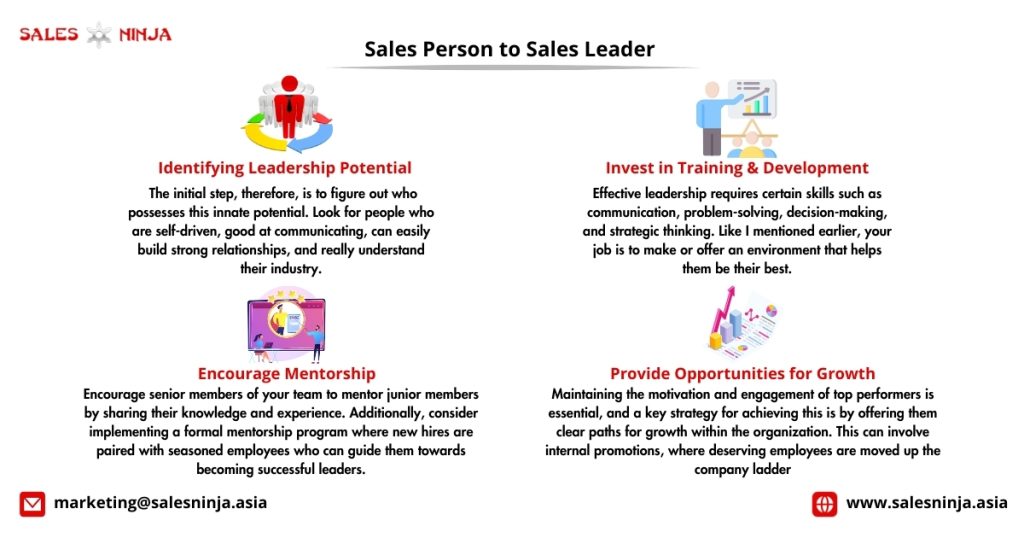
Yes, it is definitely possible for a B2B (Business-to-Business) salesperson to transition into a sales leader. The transition from a B2B salesperson to a sales leader is not only possible, but it has become increasingly common in recent years. This progression often involves a combination of skill development, experience, and the right opportunities. If you’re contemplating ways to evolve your sales team into sales leaders, here are some strategies for making that transition:
Identifying Leadership Potential
There’s a common saying that ‘Leaders are born, they are not made.’ While we can nurture and develop an individual’s latent leadership qualities, we cannot just make someone a leader out of nowhere.
The initial step, therefore, is to figure out who possesses this innate potential. Look for people who are self-driven, good at communicating, can easily build strong relationships, and really understand their industry. Once such individuals are identified, it’s crucial to cultivate their abilities by providing them with opportunities to shoulder more responsibilities and lead projects or initiatives within the team.
This approach allows for the organic growth of leadership skills in those who are naturally inclined towards such roles.
Invest in Training and Development
Effective leadership requires certain skills such as communication, problem-solving, decision-making, and strategic thinking. Like I mentioned earlier, your job is to make or offer an environment that helps them be their best.
This necessitates a significant investment in training programs tailored to developing these vital skills in your B2B sales team. This could include workshops or seminars led by experienced professionals or providing access to online courses or resources related to leadership development.
Encourage Mentorship
Encourage senior members of your team to mentor junior members by sharing their knowledge and experience. Additionally, consider implementing a formal mentorship program where new hires are paired with seasoned employees who can guide them towards becoming successful leaders. Additionally, you can introduce a unique initiative where, for one day, a junior team member plays the role of a leader or mentor.
This practical experience is invaluable, allowing them to learn firsthand what it takes to lead. This method not only provides them with real-world leadership experience but also instils confidence and a deeper understanding of the responsibilities involved in such roles.
This type of initiative is gaining popularity in modern organizations, as it has shown significant benefits in nurturing future leaders.
Provide Opportunities for Growth
Maintaining the motivation and engagement of top performers is essential. And a key strategy for achieving this is by offering them clear paths for growth within the organization. This can involve internal promotions, where deserving employees are moved up the company ladder, or by broadening their experience and skill set through added responsibilities or rotating them through different job roles.
Demonstrating that there are tangible prospects for advancement within the company structure not only keeps your B2B sales team engaged but also encourages them to aim for leadership roles. By investing in their career development, you signal a commitment to their professional growth, which in turn fosters a more ambitious and dedicated sales force.
Techniques and Strategies for Developing Sales Leadership Skills
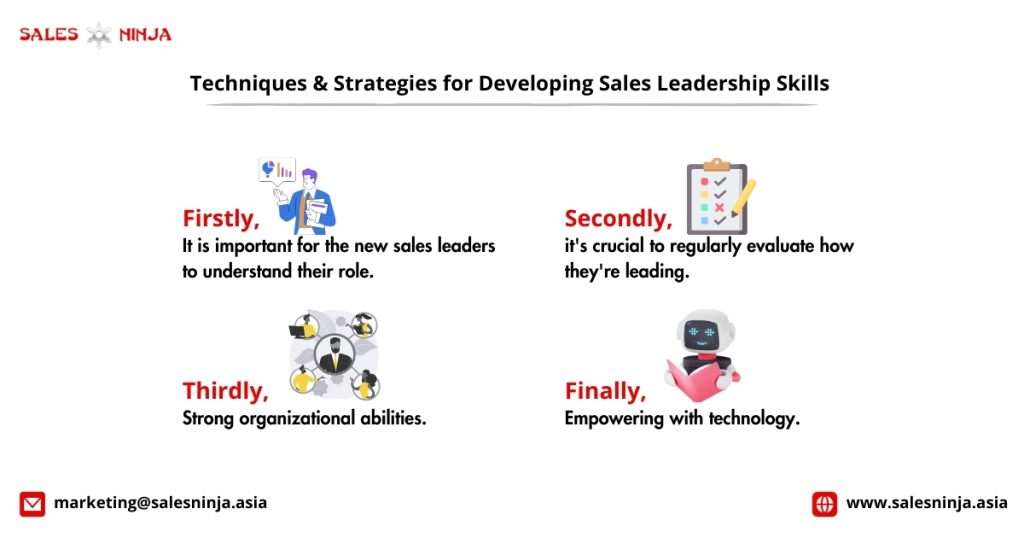
Being a successful sales leader is about much more than just managing everyday sales tasks. It’s about evaluating the current performance of both the team and the company, and setting clear, realistic goals. A sales leader needs to make well-thought-out decisions, create practical plans. And also motivate each member of the sales team to give their best effort.
However, it’s common for top-performing salespeople to be promoted to leadership roles based on their sales achievements. But once in these roles, they often find that the skills that made them great salespeople are not the same skills needed to excel as leaders. This realization can be quite a surprise. In such cases, the focus of a sales leader should shift to what’s truly important in their new role. And what are those?
1) Firstly, it is important for the new sales leaders to understand their role:
as a coach and mentors rather than just being focused on their own personal achievements. Their focus should shift to motivating and guiding team members, setting clear objectives, and offering support as needed. However, a common mistake among sales leaders is to view their role as merely instructing their team on what to do.
But let me tell you, simply commanding people isn’t the way to elicit high performance. Instead, the key lies in inspiring them to give their best. This often starts with demonstrating trust in their abilities, to the extent that you don’t overshadow their contributions or insist that there’s only one correct method to accomplish tasks.
2) Secondly, it’s crucial to regularly evaluate how they’re leading:
This means taking a step back and thinking about their own leadership style and how effective it is. They should actively seek feedback, not just from the people above them but also from their own team members. Hearing different perspectives can give a leader a clearer picture of what’s working and what’s not. This might mean adjusting their approach, trying new strategies, or even changing the way they communicate with their team. The goal is to become the best leader they can be, and that often involves growing and changing along with the needs of their team.
3) Thirdly, strong organizational abilities:
There’s a common challenge that sales leaders face: the temptation to take over tasks that their team should be handling. This often stems from a desire to manage time more efficiently. It can seem quicker and simpler for a leader to step in and fix issues directly rather than allowing their team members to work through them.
However, this practice is counterproductive in the long run and should be actively discouraged. Instead, sales leaders need to focus on honing their ability to prioritize tasks effectively. This involves not only managing their own time well but also ensuring that their team is spending time on the right tasks. Basically, the main thing sales leaders need to do is not take over too much or jump in too soon. Moreover, they should be capable of swiftly adapting to changes in market trends or shifts in the company’s strategy.
4) Finally, empowering with technology:
The focus for sales leaders should be on leveraging technology not as a mandate but as a strategic asset. Demonstrating to the team the practical benefits of technology in the sales process can be transformative. This approach not only elevates the team’s performance. But also underscores the leader’s commitment to providing resources that bolster the team’s success. In doing so, the leader not only advances their own skills in technology application. But also fosters a more productive, data-driven, and insightful working environment. This dual focus on personal and team development through technology is a key hallmark of a forward-thinking sales leader.
Developing effective sales leadership skills requires continuous personal growth coupled with an understanding of how best to motivate one’s team toward success! By implementing these techniques and strategies into your approach as a leader within this field. We’re confident you’ll see improvements not only within yourself but also from those around you making up what would eventually become an unstoppable force driving record levels of revenues throughout any company lucky enough having someone like YOU at its helm!
Sharp Your Leadership Skills with Sales Ninja
We get what you need, and to support you on your leadership path, we’ve designed our ‘B2B Sales Leadership: Lead Your B2B Sales Team To Achieve 2024 Sales Targets‘ training program. It’s packed with tested sales management methods and AI tools to excel in sales leadership and B2B sales process management. Our goal is to provide sales leaders with the right mindset and skills to successfully lead any B2B sales team.

Who Can Join?
- Experienced B2B Sales Leaders seeking to refine their strategies and learn about AI tools.
- Sales Directors, Managers, and Team Leaders looking to understand advanced sales methodologies and AI applications like ChatGPT.
- Entrepreneurs and Business Owners who want to deepen their knowledge of the B2B sales process for business growth.
- New B2B Sales Leaders aiming to quickly master sales management and team leadership.
Why Should Join?
This program is a unique chance for sales professionals to enhance their leadership and sales abilities, offering advanced strategies, AI technology insights, and hands-on experience in interactive workshops. Additionally, it will be an opportunity to network with industry professionals and exchange valuable insights.
Check out:
So, if you are looking to stay competitive and effectively lead your teams in today’s rapidly evolving market. Undoubtedly, it’s an ideal choice for you.




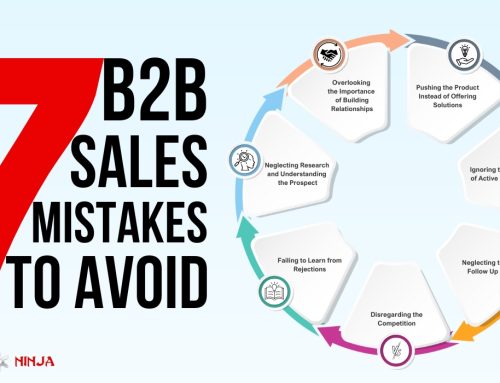
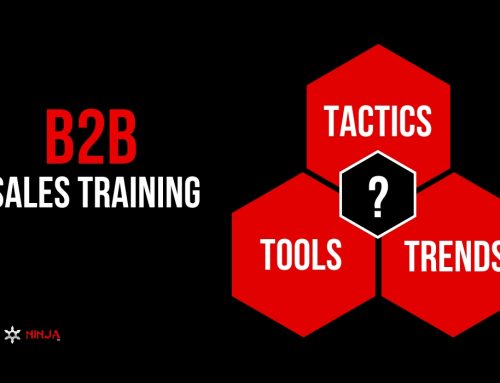
Leave A Comment